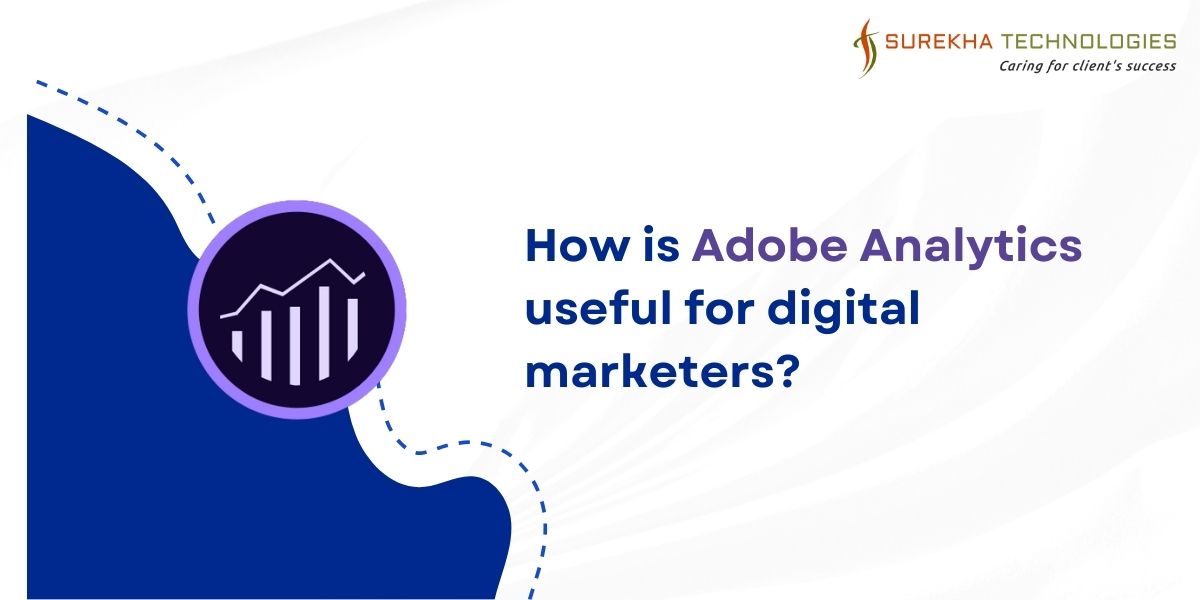How is Adobe Analytics useful for digital marketers?

Adobe Analytics Integration Services & Adobe Analytics: How is Adobe Analytics Useful for Digital Marketers?
In the digital age, data is the cornerstone of effective marketing. Digital marketers face the challenge of analyzing vast amounts of data to create targeted campaigns, improve customer experiences, and maximize return on investment (ROI). Adobe Analytics is one of the most powerful tools for achieving these goals. With advanced features, real-time insights, and seamless integration options, Adobe Analytics has become indispensable for modern marketers. This article explores how Adobe Analytics and Adobe Analytics integration services can empower digital marketers to achieve better results.
What is Adobe Analytics?
Adobe Analytics is a leading data analytics platform designed to provide businesses with actionable insights from their digital properties. It enables marketers to track, measure, and analyze customer behaviors across multiple channels, such as websites, mobile apps, and social media platforms. Adobe Analytics goes beyond basic data reporting by leveraging artificial intelligence (AI) and machine learning (ML) capabilities to provide predictive insights and comprehensive data visualizations.
By utilizing Adobe Analytics integration services, businesses can connect the platform with other tools, such as customer relationship management (CRM) systems, email marketing platforms, and content management systems (CMS), creating a cohesive marketing ecosystem.
Key Benefits of Adobe Analytics for Digital Marketers
1. Comprehensive Customer Journey Insights
Understanding the customer journey is critical for digital marketing success. Adobe Analytics enables marketers to track every interaction a user has with their brand, from initial awareness to final conversion. By analyzing this data, marketers can identify pain points, optimize user experiences, and create personalized campaigns.
Adobe Analytics’ pathing analysis and flow visualization tools allow marketers to see how customers navigate through websites or apps. This helps identify the most effective content and channels for driving engagement and conversions.
2. Real-Time Data and Actionable Insights
Timely decision-making is essential in the fast-paced world of digital marketing. Adobe Analytics provides real-time data, allowing marketers to monitor campaigns and adjust strategies on the fly. For example, if a specific campaign is underperforming, marketers can quickly identify the issue and implement corrective measures.
The AI-powered Adobe Sensei, integrated within Adobe Analytics, delivers predictive analytics and recommendations. This enables marketers to anticipate customer behaviors and craft data-driven strategies.
3. Advanced Segmentation and Personalization
Segmentation is a fundamental aspect of digital marketing. Adobe Analytics allows marketers to create detailed audience segments based on various factors, such as demographics, behaviors, and preferences. These insights can be used to deliver highly personalized experiences, which are proven to boost engagement and conversions.
Through Adobe Analytics integration services, marketers can sync segmentation data with advertising platforms like Google Ads or email marketing tools. This ensures consistent messaging and targeting across all channels.
4. Multi-Channel Attribution
Attributing success to the right marketing efforts can be challenging, especially when customers interact with multiple channels before converting. Adobe Analytics’ multi-channel attribution models help marketers understand the effectiveness of each touchpoint in the customer journey. This insight enables better allocation of resources and optimization of marketing budgets.
5. Enhanced Campaign Performance
Adobe Analytics empowers marketers with the ability to measure the performance of their campaigns in real time. From click-through rates to conversions, Adobe Analytics provides detailed metrics that help marketers gauge the success of their efforts. By analyzing this data, they can refine their campaigns for maximum effectiveness.
6. Seamless Integration with Marketing Tools
One of the standout features of Adobe Analytics is its ability to integrate seamlessly with other Adobe products and third-party tools. Adobe Analytics integration services enable businesses to connect the platform with Adobe Experience Cloud, Google Analytics, Salesforce, and other systems. This integration ensures a unified view of customer data and enhances cross-channel marketing strategies.
7. Data Visualization and Reporting
Data is only useful when it is accessible and understandable. Adobe Analytics offers intuitive dashboards and data visualization tools that help marketers interpret complex data with ease. Customizable reports allow marketers to focus on the metrics that matter most to their business goals.
Use Cases for Adobe Analytics in Digital Marketing
Optimizing Website Performance
Adobe Analytics helps marketers analyze website performance by tracking metrics like page load times, bounce rates, and user navigation paths. By identifying and addressing issues, marketers can enhance user experiences and improve SEO rankings.
Enhancing Email Marketing Campaigns
By integrating Adobe Analytics with email marketing platforms, marketers can track email open rates, click-through rates, and conversion rates. This data enables them to refine email content and timing to achieve better results.
Improving Social Media Strategies
Social media plays a crucial role in digital marketing. Adobe Analytics allows marketers to measure the effectiveness of social media campaigns by analyzing engagement metrics, referral traffic, and conversions. These insights help marketers optimize their social media strategies.
Driving E-commerce Success
For e-commerce businesses, Adobe Analytics provides valuable insights into customer purchasing behaviors, cart abandonment rates, and product performance. By leveraging these insights, marketers can improve product recommendations and increase sales.
Why Adobe Analytics Integration Services are Crucial
Adobe Analytics integration services enhance the platform’s functionality by connecting it with other marketing tools. This integration ensures a seamless flow of data, enabling marketers to:
- Consolidate customer data from multiple sources.
- Automate workflows and data synchronization.
- Create a unified view of customer interactions across all channels.
- Improve collaboration between marketing, sales, and customer support teams.
Whether it’s integrating Adobe Analytics with a CMS to deliver personalized web experiences or syncing it with a CRM for better lead nurturing, these services maximize the value of Adobe Analytics.
Conclusion
Adobe Analytics and Adobe Analytics integration services are game-changers for digital marketers. From providing deep customer insights to enabling real-time decision-making and seamless integrations, Adobe Analytics empowers marketers to create data-driven strategies that deliver results. In a competitive digital landscape, investing in Adobe Analytics is not just an option but a necessity for businesses aiming to stay ahead. Whether you’re optimizing campaigns, enhancing personalization, or tracking multi-channel attribution, Adobe Analytics is the ultimate tool for achieving marketing success.
Note: IndiBlogHub features both user-submitted and editorial content. We do not verify third-party contributions. Read our Disclaimer and Privacy Policyfor details.











